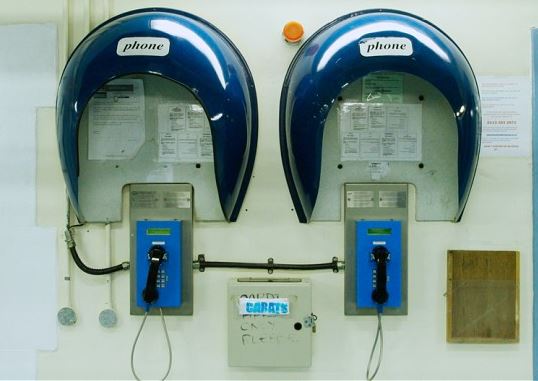A new (31 October 2019) joint report by the Prison Reform Trust, INQUEST and Pact (the Prison Advice and Care Trust), reveals that most prisons in England and Wales are failing in their duty to ensure that emergency phone lines are in place for families to share urgent concerns about self-harm and suicide risks of relatives in prison. This is in serious breach of government policy that families should be able to share concerns ‘without delay’.
At a time of unprecedented levels of self-harm in prisons, charities are calling on prisons to protect the lives of people in prison and address these critical failures. In the 12 months to June 2019 there were 60,594 self-harm incidents in prisons – compared to 26,000 a decade earlier.
The report maps the provision of safer custody telephone lines across the prison estate – dedicated phone lines which enable family members and others to pass on urgent information when they have concerns.
It finds that provision is patchy, under-resourced and even non-existent in some prisons, leaving families struggling to share their concerns with prison staff. The report reveals that:
- Almost two in five (37%) prisons in England and Wales appeared to have no functioning dedicated safer custody telephone lines for families to get in touch.
- Of these, nearly one in five prisons (18%) had no publicly advertised number for a dedicated safer custody telephone line.
- A further 18% of prisons advertised a dedicated line, but when called the number either wasn’t operational, was not answered, or went through to a general prison switchboard.
- Of the 75 dedicated safer custody telephone lines that went through to safer custody departments, only 13 (17%) were answered by a member of staff.
- Over 80% of dedicated safer custody lines that went through to safer custody departments (62 prisons in total) put the caller straight through to an answer machine.
The safety and wellbeing of prisoners is put at risk when families and friends are unable to share urgent safeguarding information with the prison. Lord Farmer’s independent review on strengthening family ties recommended that all prisons should establish a gateway communication system for families to relay urgent safety concerns. Prison policy now requires establishments to have a means for families to get in touch “without delay” when they have concerns they need to pass on. This report shows that policy is not being put into practice.
The issue came to public attention earlier this year when HM Inspectorate of Prisons reported on conditions at HMP Bristol. It found that “…a hotline for the family and friends of those in crisis, to call and report their concerns, had not been checked by staff at all for the two weeks before the inspection.”
Findings
The findings of the report suggest that the problems uncovered by inspectors at HMP Bristol may be commonplace. Of the 62 dedicated safer custody lines which put the caller through to an answer machine:
- 36 (57%) provided no alternative number or signposting should the caller have an urgent safeguarding concern or was calling outside of office hours.
- 4 answer machines had no recorded message from the prison.
- Only 23 (36%) of the answer machine messages informed the caller how regularly messages were checked. Where they did provide information, this varied from ‘every morning’ to ‘daily during weekday office hours’ to ‘twice a day’.
- Only 13 (20%) of the answer machine messages said that they would call the caller back. One message stated that ‘we may not be able to call you back due to data protection’.
Data from the services for prisoners and their families provided by Pact and the Prison Reform Trust add to the evidence that many prisons are failing to ensure that families are able to get in touch when they have concerns (see notes below). The authors of the report also spoke to family members about the difficulties they had experienced in attempting to share safer custody concerns with prisons.
One family member said:
“I have probably contacted the safer custody line about 20-25 times between January and June this year. About 40% of the time someone picks up and says that they will check on him and then ring me back…but they have never rung me back.
On one occasion I left a message 4 times before they rang me back. You have to push it to the nth degree. It’s only when you take it to ‘threat to life’ do they return your call.
The Chaplaincy never rang me back and I left a message over and over.”
Poor arrangements for families to get in touch with prisons have been identified in inquests into the deaths of prisoners. In June 2019, the inquest into the death by natural causes of Jordan Hullock, aged 19, at HMP Doncaster heard evidence that “when Jordan stopped communicating, his mother emailed and phoned the prison with her concerns, but to no avail.” Although his mother had contacted the prison on numerous occasions prior to and when Jordan had been hospitalised, she was not told where he was until the following day when he had already been placed in an induced coma.
Commenting on the report, Peter Dawson, Director of the Prison Reform Trust, said:
“It doesn’t take much imagination to understand the anguish of a family member trying to tell a prison that their loved one inside is at immediate risk but not being able to do so. Lord Farmer’s report demanded action, and the Prison Service promised it. But this report shows that the problem is a very long way from being solved. Lives may depend on the ability to get an urgent message through – every prison should have a system in place and be testing it regularly.”
The timing of the report is particularly damning, since the previous day the MoJ published its progress report on implementing the recommendations of the Farmer Report, claiming that:
100% of the recommendations are in the process of being implemented.
Thanks to Andy Aitchison for kind permission to use the images in this post. You can see Andy’s work here.









